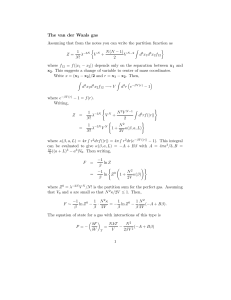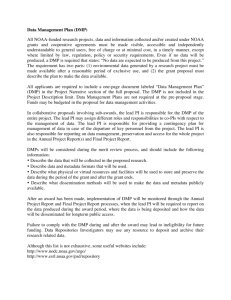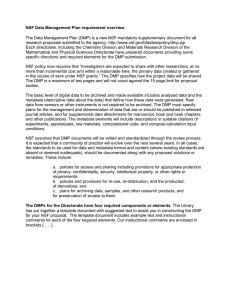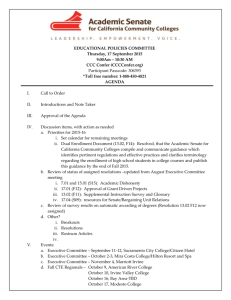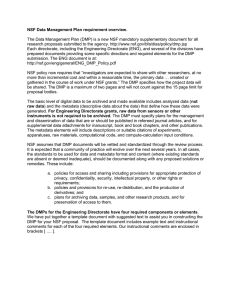COLLEGE OF VETERINARY MEDICINE COURSE AND CURRICULUM CHANGES approved by the
advertisement
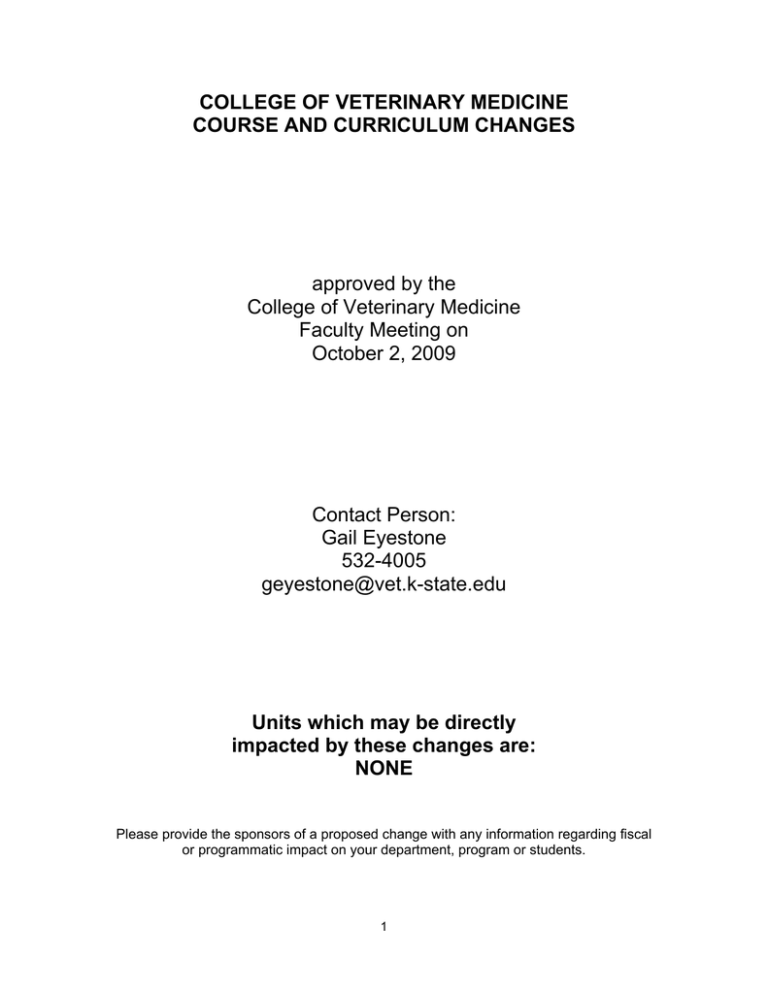
COLLEGE OF VETERINARY MEDICINE COURSE AND CURRICULUM CHANGES approved by the College of Veterinary Medicine Faculty Meeting on October 2, 2009 Contact Person: Gail Eyestone 532-4005 geyestone@vet.k-state.edu Units which may be directly impacted by these changes are: NONE Please provide the sponsors of a proposed change with any information regarding fiscal or programmatic impact on your department, program or students. 1 EXPEDITED COURSE CHANGES Department of Clinical Sciences CHANGE: CS 806. Supplemental Equine. (2) I. II. S. An opportunity to pursue additional equine studies (medicine, surgery, etc.) in depth and assume substantial responsibility for care of hospitalized cases. Students will present a seminar on a medicine or surgical subspecialty and pursue a special problem. Pr.: Fourth-year standing in the College of Veterinary Medicine. TO: CS 806. Supplemental Equine. (2-4) I. II. S. An opportunity to pursue additional equine studies (medicine, surgery, etc.) in depth and assume substantial responsibility for care of hospitalized cases. Students will present a seminar on a medicine or surgical subspecialty and pursue a special problem. Pr.: Fourth-year standing in the College of Veterinary Medicine. RATIONALE: This course will be offered as a 2 or 4 credit elective. EFFECTIVE DATE: Summer 2010 DROP: CS 871. Fund. of Feedlot Health and Mangt. (3) S. Practical experience in feedlot operational management consisting of 320-400 hours of an on-location practicum in a cattle feeding environment. Pr.: CS 870. Successful completion of the second-year of the professional curriculum in the College of Veterinary Medicine with a cumulative GPA of 3.0 or better and no grade below a C. RATIONALE: This course will no longer be offered in the curriculum. EFFECTIVE DATE: Fall 2009 CHANGE: CS 899. Research in Clinical Sciences. (1-6) I. II. S. Individual research in any of the fields of Clinical Sciences. Pr.: Graduate standing. This work may form the basis of the M.S. thesis. TO: CS 899. Research in Clinical Sciences. (1-6) I. II. S. Individual research in any of the fields of Clinical Sciences. Pr.: Graduate standing. This work may form the basis for either the M.S. Thesis or the M.S. Report. RATIONALE: Changes made to this course will allow graduate students to use the report option for their master’s degree. EFFECTIVE DATE: Spring 2010 2 Department of Diagnostic Medicine/Pathobiology CHANGE: DMP 715. General Pathology. (5) I. Etiology, pathogenesis, lesions, and termination of processes of disease, including inflammation, necrosis, regeneration, oncology, and disturbances of metabolism, circulation, and growth. Three hours lec. And six hours lab a week. Pr.: AP 700, AP 705 and AP 710. TO: DMP 715. General Pathology. (4) I. Etiology, pathogenesis, lesions, and termination of processes of disease, including inflammation, necrosis, regeneration, oncology, and disturbances of metabolism, circulation, and growth. Three hours lec. And four hours lab a week. Pr.: AP 700, AP 705 and AP 710. RATIONALE: Part of the college wide curriculum revision processes. EFFECTIVE DATE: Fall 2010 CHANGE: DMP 718. Veterinary Parasitology. (5) I. Study of the helminth, arthropod, and protozoan parasites of companion and food animals. Emphases are on diagnosis, clinical signs, lesions, treatment, control epidemiology, and public health aspects of parasitic disease. Three hours lec. and six hours lab a week. Pr.: AP 710 and DMP 708. TO: DMP 718. Veterinary Parasitology. (4) I. Study of the helminth, arthropod, and protozoan parasites of companion and food animals. Emphases are on diagnosis, clinical signs, lesions, treatment, control epidemiology, and public health aspects of parasitic disease. Three hours lec. and four hours lab a week. Pr.: AP 710 and DMP 708. RATIONALE: Part of the college wide curriculum revision processes. EFFECTIVE DATE: Fall 2010 CHANGE: DMP 770. Emerging Diseases. (3) II. An investigation into recently identified emerging diseases, the conditions that enable their emergence, and the human health implications of each disease. This class is open to all students with some biology background, as well as veterinary students. Pr.: 3 hours of Biology above a 700 level. TO: DMP 770. Emerging Diseases. (3) S, Intersession. An investigation into recently identified emerging diseases, the conditions that enable their emergence, and the human health implications of each disease. This class is open to all students with some biology background, as well as veterinary students. Pr.: 3 hours of Biology above a 700 level. RATIONALE: This course is currently offered in the spring. Changing catalog to reflect new Summer Intersession (Aug) status. EFFECTIVE DATE: CHANGE: Summer Intersession 2010 DMP 775. Clinical Pathology. (3) II. Principles, application, and interpretation of clinical laboratory procedures, and experience with applicable techniques. Two hours lec. and three hours case discussion or lab a week. Pr.: DMP 705 and DMP 715. 3 TO: DMP 775. Clinical Pathology. (4) II. Principles, application, and interpretation of clinical laboratory procedures, and experience with applicable techniques. Three hours lec. and four hours case discussion or lab a week. Pr.: DMP 705 and DMP 715. RATIONALE: Part of the college wide curriculum revision processes. EFFECTIVE DATE: Spring 2011 DROP: DMP 777. Laboratory Diagnosis. (1) I. Laboratory techniques in hematology, cytology, bacteriology, mycology, urology, and clinical chemistry as applied to the diagnosis of animal diseases. Two hours lec. and three hours case discussion or lab a week. Pr.: DMP 705 and DMP 715. RATIONALE: This course curriculum will now be be absorbed into DMP 775. (We have increased DMP 775 hours to reflect this). EFFECTIVE DATE: Fall 2010 CHANGE: DMP 801. Toxicology. (3) I. Effects of harmful substances on the animal body. Emphasis placed on toxicological principles and management of the poisoned patient. Three hours lecture a week plus three one-to three-hour field trips. Pr.: Third-year standing in the College of Veterinary Medicine, BIOCH 521, and AP 747. TO: DMP 801. Toxicology. (2) II. Effects of harmful substances on the animal body. Emphasis placed on toxicological principles and management of the poisoned patient. Four hours of lecture a week for half of the semester plus three one-to three-hour field trips. Pr.: Second-year standing in the College of Veterinary Medicine, BIOCH 521, and AP 747. RATIONALE: We are not going to offer in the Fall Term. EFFECTIVE DATE: Spring 2011 CHANGE: DMP 806. Envir. Toxicology. (2) II, in odd years. An advanced toxicology course concerned with the occurrence, biological effect, detection, and control of foreign chemicals in the environment. Pr.: Consent of staff. TO: DMP 806. Envir. Toxicology. (2) II. An advanced toxicology course concerned with the occurrence, biological effect, detection, and control of foreign chemicals in the environment. Pr.: Consent of staff. RATIONALE: This course is currently offered in the Spring of odd years. Changing catalog status to reflect that it will now be offered EVERY Spring. EFFECTIVE DATE: DROP: Spring 2010 DMP 810. Diagnostic Methods in Feedlot Mangt. (3) S. Practical experience in feedlot operation and bovine necropsy diagnosis consisting of 40 hours in bovine necropsy and 320 hours of an on-location practicum in a cattle feedlot. Pr.: Successful completion of the first-year professional curriculum in the College of Veterinary Medicine with a cumulative GPA of 3.0 or better and no grade below 2.0. 4 RATIONALE: This course will no longer be offered in the curriculum. EFFECTIVE DATE: Fall 2009 DROP: DMP 811. Fundamentals of Feedlot Management. (3) S. Practical experience in feedlot operational management consisting of 320-400 hours of an on-location practicum in a cattle feeding environment. Pr.: DMP 810. Successful completion of the second-year of the professional curriculum in the College of Veterinary Medicine with a cumulative GPA of 3.0 or better and no grade below 2.0. RATIONALE: This course will no longer be offered in the curriculum. EFFECTIVE DATE: Fall 2009 CHANGE: DMP 854. Disease Epidemiology. (3) I. Epidemiologic principles of disease with a focus on measures of disease occurrence, association and impact, determinants of disease diagnostic test evaluation, study design and critical literature evaluation. Pr.: STAT 703 or DMP 830 or equivalent. TO: DMP 854. Intermediate Epidemiology. (3) II. Epidemiologic principles of disease with a focus on measures of disease occurrence, association and impact, determinants of disease diagnostic test evaluation, study design and critical literature evaluation. Pr.: DMP 708 or DMP 754 or equivalent AND STAT 703 or DMP 830 or equivalent. RATIONALE: Change from Fall to Spring offering – Moving this course to a spring offering will allow graduate and MPH students that begin in the fall to fulfill prerequisites and take this course during their first year. Name Change – The name change is requested to establish a clear sequence within the Epidemiology core classes beginning with DMP 754 Introduction to Epidemiology (submitted as a new course), DMP 854 Intermediate Epidemiology and DMP 954 Advanced Epidemiology. Prerequisite change – The addition of DMP 754 as an acceptable prerequisite course will allow MPH and non- DVM students who have not taken DMP 708 to qualify for this course. IMPACT: Only a name, scheduling and prerequisite change. EFFECTIVE DATE: Fall 2010 (Not offered Fall 2010 with switch to Spring 2011) CHANGE: DMP 860. Pathogenic Mechanisms. (3) II, in odd years. Virulence factors of infectious microorganisms and the host response to infection. Topics include pathogenesis of human and animal diseases and mechanism of immunity. Pr.: DMP 712 or BIOL 690. TO: DMP 860. Pathogenic Mechanisms. (3) I, in even years. Virulence factors of infectious microorganisms and the host response to infection. Topics include pathogenesis of human and animal diseases and mechanism of immunity. Pr.: DMP 712 or BIOL 690. RATIONALE: Change in term offering so not to conflict with DMP 910. EFFECTIVE DATE: Fall 2010 5 CHANGE: DMP 910. Pathogenic Mechanisms of Viruses. (3) I, in even years. The goals of the course are to learn various pathogenic mechanisms (virus-host interactions) of selected virus (RNA and DNA) and Prion diseases. The course will cover the molecular, cellular and immunological bases of pathogenesis both in vitro and in animal models. Pr.: BIOL 730 and BIOL 670. TO: DMP 910. Pathogenic Mechanisms of Viruses. (3) II, in even years. The goals of the course are to learn various pathogenic mechanisms (virus-host interactions) of selected virus (RNA and DNA) and Prion diseases. The course will cover the molecular, cellular and immunological bases of pathogenesis both in vitro and in animal models. Pr.: BIOL 730 and BIOL 670. RATIONALE: Changing of the term offered to Spring so not to conflict with DMP 860. EFFECTIVE DATE: Spring 2010 CHANGE: DMP 954. Design and Interpretation of Epidemiologic Research. (3) II. Advanced theory and methods for designing, analyzing and interpreting epidemiologic research. Emphasis on observational study design and analysis issues including design identification and optimization, bias recognition and control, and appropriate analytical approaches for epidemiologic data. Pr.: DMP 854 and STAT 717, or equivalent training. TO: DMP 954. Advanced Epidemiology. (4) I. Advanced theory and methods for designing, analyzing and interpreting epidemiologic research. Emphasis on observational study design and analysis issues including design identification and optimization, bias recognition and control, and appropriate analytical approaches for epidemiologic data. Pr.: DMP 854 and STAT 717, or equivalent training (recommended). RATIONALE: Change from Spring to Fall offering – Moving this course to a fall offering will allow graduate students in the epidemiology track of DMP to take DMP 754 (Intro to epidemiology) in their first fall semester, DMP 854 (Intermediate epidemiology) in their first spring semester, and then this course (DMP 954) in their second fall semester. For those that are in advanced programs requiring DMP 954 (to be offered every other year) the sequence of placing it in the fall will be logical and permit most students who wish/need the course to have a chance to take it during a typical PhD period of study and apply the material before their research/writing is underway. Name Change – The name change is requested to establish a clear sequence within the Epidemiology core classes beginning with DMP 754 Introduction to Epidemiology (submitted as a new course), DMP 854 Intermediate Epidemiology and DMP 954 Advanced Epidemiology. Credit hour added – an intensive computer laboratory component has been added to the course, requiring additional contact hours. IMPACT: Only a name and scheduling change. Sequence assists in changes to DMP 754 (proposed) and DMP 854. EFFECTIVE DATE: Spring 2010 6 NON-EXPEDITED COURSE CHANGES Department of Clinical Sciences CHANGE: CS 709. Medicine I. (4) II. Consideration of medical and pathophysiologic aspects of diseases affecting the musculoskeletal, respiratory, cardiovascular special senses, nervous hemic and lymphatic systems. Four hours lec. a week. Pr.: Second-year standing in the College of Veterinary Medicine. TO: CS 709. Medicine I. (4) I. Consideration of medical and pathophysiologic aspects of diseases affecting the musculoskeletal, respiratory, cardiovascular special senses, nervous hemic and lymphatic systems. Four hours lec. a week. Pr.: Third-year standing in the College of Veterinary Medicine. RATIONALE: This is part of the restructuring of the CVM curriculum to adjust to the future needs of our veterinary students. EFFECTIVE DATE: Spring 2010 ADD: CS 776. Advanced Urinary. (1) II. This elective builds on the case-based urinary section of CS 711. Focus of the class will be on the disease pathophysiology and treatment. Pr.: Third year standing in the College of Veterinary Medicine. RATIONALE: This elective course will allow students to gain a greater understanding of the pathophysiology and management of common diseases/disorders of the canine and feline urinary tract. EFFECTIVE DATE: Spring 2010 ADD: CS 825. International Vet Study Tours. (1-4) I. II. S. Faculty-led trip for students to explore veterinary medicine in a foreign country. Prior to travel, students will learn about the country through lectures, research, presentations. During the trip they will interact with nationals in the veterinary profession and experience the culture. Pr.: Enrolled as a 1st-3rd year or grad student in the College of Vet Med. Additional students admitted with discretion of faculty leading the tour. RATIONALE: This course will facilitate CVM faculty who wish to lead a study abroad tour through the Office of International Programs. The course will provide the framework for faculty to design individual study abroad program activities. EFFECTIVE DATE: Spring 2010 7 Department of Diagnostic Medicine/Pathobiology ADD: DMP 754. Introduction to Epidemiology. (3) I. The purpose of this course is to introduce students to the basic principles and methods of epidemiology in order to recognize and understand how disease affects populations (and the associated implications for individuals). This course will prepare students to use epidemiologic methods to solve current and future challenges to diagnose, treat, prevent, and control disease during their professional training and throughout their career. RATIONALE: This course will provide an introduction to epidemiology for MS and PhD students in the Department of Diagnostic Medicine/Pathobiology, as well as MPH (Masters of Public Health) and other diciplines; and will be taught on-line only. This course will be added to two current epidemiology courses being taught within DMP. The three courses are being reorganized and renamed (but with retained course numbers) in order to provide a clear progression of epidemiology training: DMP754 - Introduction to Epidemology (proposed course), DMP 854 - Intermediate Epidemiology (currently named Disease Epidemiology), and DMP 954 - Advanced Epidemiology (currently named Design and Interpretation of Epidemiologic Research). This course will serve as a required core course for MPH students unless they substitute DMP 708 - Principles and methods of epidemiolgy, which is offered in the veterinary medical curriculum. There are four areas of emphasis within the Master of Public health Program: Public health nutrition, Public health physical activity, Food safety & biosecurity, and Infectious diseases & zoonoses. Currently, DMP 708 is the required epidemiology course for all MPH students. Because this course was developed for veterinary students primarly being trained in production medicine as well as infectious and zoonotic diseases it is not ideal for MPH students focused in the other emphasis areas. In addition, DMP 708 cannot accommodate very many students in addition to veterinary students due to facility constraints. Providing the course in an on-line format will provide access to off-campus graduate students interested in pursuing an MPH, MS, or PhD requiring an introduction to epidemiology. IMPACT: MPH Program. The MPH Coordinaing Committee supports both the creation of this course and in making it a required core course for MPH students; that is, with the exception of dual DVM/MPH students who can substitute DMP 708 as the core epidemiology course. Other departments providing the majority of courses for the MPH Program are: Food Science (Agriculture), Statistics and Kinesiology (Arts and Sciences), and Human Nutrition (Human Ecology). EFFECTIVE DATE: Fall 2010 8
